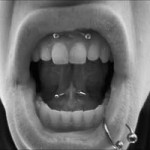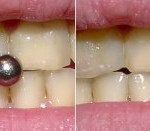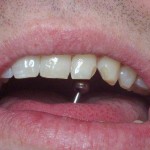Piercing is a popular way to decorate the body and enhance features. While the trend is popular, lip piercing does present some problems for the mouth and gums. If you wish to get a piercing, always visit a professional who follows proper sanitary practices. Make sure the piercing and the mouth is cleaned with mouthwash regularly to avoid infection. Good and effective tooth brushing methods must also be establish as it is the fundamental requirement for good oral hygiene.
1. Gum Irritation
A lip ring that constantly rubs against the gums can cause irritation and wear. The gums may recede after a piercing, and this can result in permanent damage to the mouth. A recent study showed that 50% of people who had worn a long barbell stem piercing (longer than 1.59 cm) for more than two years had their gum tissue pull away from the inside of their lower front teeth. There is a substantial increase in risk for patients with a tongue, lip or cheek piercing to experience gingival recession, according to the University of Hawaii. This can lead to periodontal disease of the tooth, as the root may become exposed when the gums recede. On the roots there is a layer of cementum, which anchors the tooth to the surrounding bone. Once exposed, this layer of cementum can be worn away easily and rapidly, causing the dentinal tubules to be exposed. These dentinal tubules acts as a pathway for the bacteria to go to the bone surrounding the tooth, and induce inflammation.
2. Tooth Irritation
A lip piercing may rub against the lingual side (the side facing the tongue) of the bottom teeth. The position of the piercing determines where the wear will occur on the teeth. Therefore, those who pierce the center part of the lip will experience rubbing against the lower front teeth. For individuals who have teeth which are more susceptible to dental caries, it is not advisable to get lip piercings as worn down teeth are even weaker against dental caries than usual.
In severe wears, the tooth will become very weak and brittle. If the individual bites on something hard accidentally, the tooth may become completely fractured and the individual will experience pain. This is known as the cracked tooth syndrome and a dentist has to be seen as soon as possible to prevent infection and other complications.
3. Interfering with Eating and Talking
A lip ring may interfere with the way the mouth forms words, especially the words containing alphabets like ‘d’ , ‘j’ , ‘l’ , ‘n’, and ‘t’. This can lead to a speech impediment caused by the lip jewelry as the tongue needs to touch the teeth, the lips, or the palate to pronounce those alphabets.
The lip ring may also interfere with eating as we need our tongue to roll the food after they after being chewed. The tongue also helps with pushing the food bolus down the esophagus from the mouth.
If there is any inflammation or infection occurring at the site of piercing, due to swelling or edema which is caused by excess of interstitial fluid in this area, talking and eating will be even more difficult.
4. Bacterial Infections
There is an increased risk of bacterial infection after a piercing, according to the American Dental Association. The mouth is full of bacteria and most of them are harmful (in fact, the mouth has the collection of most bacteria compared to any other parts of the body) , and a piercing provides an entry into the body that may result in infection. Good hygiene is important after a piercing of any kind, but a lip or tongue piercing is especially vulnerable to bacterial infection, so extra care should be taken.
5. Inflammation
Inflammation of the lip often occurs after a piercing. The swelling of the mouth may indicate an infection that should be evaluated by a dentist if it does not diminish within a few days after the piercing.
6. Allergies
Some patients may be allergic to the metals used in mouth jewelry. This can cause an allergic reaction, which may be serious and even life threatening.
7. Excessive Drooling
Oral piercings stimulate the salivary gland, not unlike food, because it is a foreign body in the mouth. This results in excessive drooling. This side effect of mouth piercing can be a particularly embarrassing condition if not well managed.
8. Scarring
Some individuals report to have scars at the place where the piercing is done, no matter how much vitamin E or aloe vera is taken. In severe cases, sensation of the tongue will also be lost to the individual.
9. Interference With Oral Health Evaluation
Jewelry in the mouth can block the transmission of X-rays so abnormalities like cysts, abscesses or tumors may not be revealed. X rays are valuable diagnostic kits in dentistry as many parts of the tooth cannot be seen with the naked eye. This is because a dentist deals with very minute objects and many parts of the tooth are embedded below the gums.


